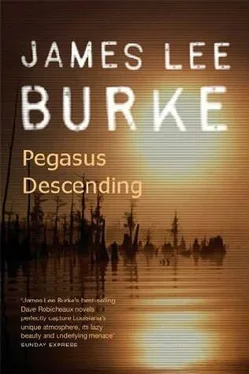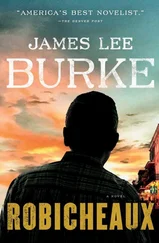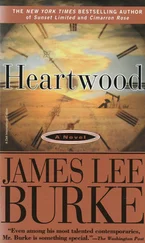“What did you tell him?”
“That you wasn’t here, that he needed to lower his voice, that this ain’t New Orleans.”
“Why New Orleans?”
“He talks like he comes from there.”
I suspected Wally had confused Bruxal’s accent, which was probably eastern seaboard, with the Irish-Italian inflections that are characteristic of blue-collar people born in New Orleans. “Why’d you call me, Wally?” I said.
“He’s on his way to Victor’s.”
“You told him I was here?”
“The janitor did. Want me to chew him out? He was seventy-t’ree last week.”
I paid my check and was about to go out the door when I saw a waxed black Humvee, wrapped with chrome, pull up to the curb. A muscular man in a powder-blue suit, with peroxided blond hair and cords in his neck and tiny pits in his cheeks, cut the engine and got out on the sidewalk. He saw me about to push open the glass door. “He’s here,” he said to a man in the passenger seat.
I did not recognize the passenger in the Humvee, but the driver had the familiarity of someone you have met in a dream, or perhaps at a time in your life when you saw the world through a glass darkly and went about making a religion out of your own dismemberment, inviting as many people as possible to bring saws and tongs to the task. The blond man pulled open the door and came inside, bringing the hot smell of the street with him.
“I told Whitey it was you. Same name, same guy, just a little older,” he said. “Remember me?”
“I’m not sure,” I lied.
“Elmer Fudd, from that bar in Opa-Locka, the one looked like a French Foreign Legion fort in the Sahara. Last time we saw each other, I gave you some breath mints.”
“If you want to talk to me, you need to come into my office at the Iberia Parish Sheriff’s Department,” I said.
“I don’t want to talk to you. But he does,” the blond man said, glancing toward his friend.
Whitey Bruxal wasn’t what I expected. Miami has always been an open city for the Mafia, which means that no one is allowed a lock on the action and no one gets clipped while he’s there on R amp; R. Consequently, during the winter season the city is filled with the lower echelons of the New York crime families. The ones I used to see on the beach had the anatomical proportions of upended tadpoles, with barrel chests, no hips, and legs that looked like tendrils, their phalluses as pronounced as bananas inside their Speedos.
But Bruxal was not a run-of-the-mill South Florida bookie. His physique reminded me of a gymnast or a man who plays tennis singles with a mean eye, under a white sun, never thinking of it as just a game. “You the guy who busted my kid?” he said, smiling at the corner of his mouth.
“I’m the detective who hooked him up and took him in. The charges are up to the prosecutor’s office,” I replied.
“I’ll fill you in. The D.A. is talking about felony assault.”
“I doubt that,” I said, and walked past him, out onto the sidewalk.
He followed me. His hair was white and thick, clipped G.I., as stiff as a brush, his skin tanned, his shirt tight on his chest and shoulders. “Doubt it why?” he said.
“Monarch Little is a dealer and general lowlife, but he usually takes his own bounce. I doubt he’ll press charges.”
“I got a problem here. Those black kids pointed a gun at my son,” he said, still smiling at the corner of his mouth.
“Yeah?”
“I haven’t heard anything about charges against the blacks. Way I see it, my son and his friend Tony Lujan are the wronged parties. I’m supposed to feel good the head gangbanger isn’t trying to send my boy to prison?”
“They may take a hit on a firearms charge. Why not wait and see?”
“That’s what you do when a concrete truck is coming down the center stripe at you?”
He was not an unpleasant man, and his beef with the prosecutor’s office not without foundation. But I could not get rid of the image of my friend Dallas Klein, kneeling in the shade of an Opa-Locka bank, just before a shotgun was fired directly into his face.
“I’ve got a problem of my own, Mr. Bruxal,” I said.
The blond man, who had been listening quietly, couldn’t suppress a laugh.
“That’s funny?” I said to him.
His eyes were bright green, his mouth spread open on one side out of his teeth. “You got boons pulling guns on people and you’re telling the victim’s father you got a problem?” he replied.
“What’s your name?”
“Lefty Raguza.” When he spoke his name, his face was charged with energy, his eyes dancing, his chin lifted.
“Thanks,” I said, writing his name in a notebook.
“What’s that for?” he asked.
“We like to research who’s in town, who’s not. You know how it is. Got to keep the down-home folks happy,” I replied, winking at him.
“You need to finish your statement to me, Mr. Robicheaux,” Bruxal said, a tanker truck loaded with gasoline passing behind him.
Don’t say it, I thought. “I think if a kid by the name of Dallas Klein had never met you and your friend here, he’d still be alive,” I said.
Bruxal looked at the blond man named Lefty Raguza. The blond man shrugged his shoulders, indicating he did not understand the reference either. “Who’s this Dallas Whatever?” Bruxal asked.
“Your man here already acknowledged he remembers me. He remembers me because we met in Opa-Locka, Florida, when he was trying to collect sixteen grand Dallas owed your sports book. Just to make sure everything is clear here, I want you to know I’m the dude who dimed you with Miami P.D. and the FBI on the armored car boost.”
Bruxal had a square chin and big bones in his cheeks. His expression remained good-natured, his brow unlined, but it was obvious he was thinking, his mind processing information, considering and rejecting various forms of response. “Tell you what, I’d like to talk with you more, but I’m going to do like my lawyer says and butt out. I’ll ask you a favor, though. You mind?”
“Be my guest,” I replied.
“If you got to hook up my son again, call me first? Slim’s dick is too big for his brains, but he’s a good kid. I didn’t have any judgment at that age. How about you? Your sizzle stick get in the way of your brains sometimes, Mr. Robicheaux?”
A moment later I watched him drive away in his Humvee with the man who had once ridiculed me when I was stone-drunk. Bruxal was slick. He had not challenged me on a personal level and he had not made any statement that was demonstrably a lie, the handle that every cop looks for in a guilty man. Instead, he had made a personal entreaty on behalf of his son and put the moral onus on me.
I had a feeling I was going to see a lot more of Whitey Bruxal.
BACK AT THE OFFICE I ran his name through the National Crime Information Center. It was not helpful. Bruxal had been interviewed several times by the FBI and Miami P.D. in the aftermath of the armored car heist and the murder of Dallas Klein and the bank teller, but he had never been directly connected to either the robbery or the homicide. Of course, this was information I already had. He had been arrested in Flatbush for driving with an expired operator’s license and fined once in the Crown Heights section of Brooklyn as a co-conspirator in the distribution of Irish Sweepstakes tickets. His third arrest was in West Palm Beach, check this out, for littering. He had been sentenced to six consecutive Saturdays on a sanitation truck.
If Bugsy Siegel had set the standard, Bruxal had fallen far short of the mark.
But the hit I got on Lefty Thomas Leo Raguza was another matter. He had done time both in Georgia and inside the Flat Top at Raiford Pen for assault with a deadly weapon and had spent a year in the Broward County Stockade for criminal possession of a firearm, a charge that had been knocked down from attempted murder. It took me less than a half hour to find his old parole officer in Fort Lauderdale.
Читать дальше












